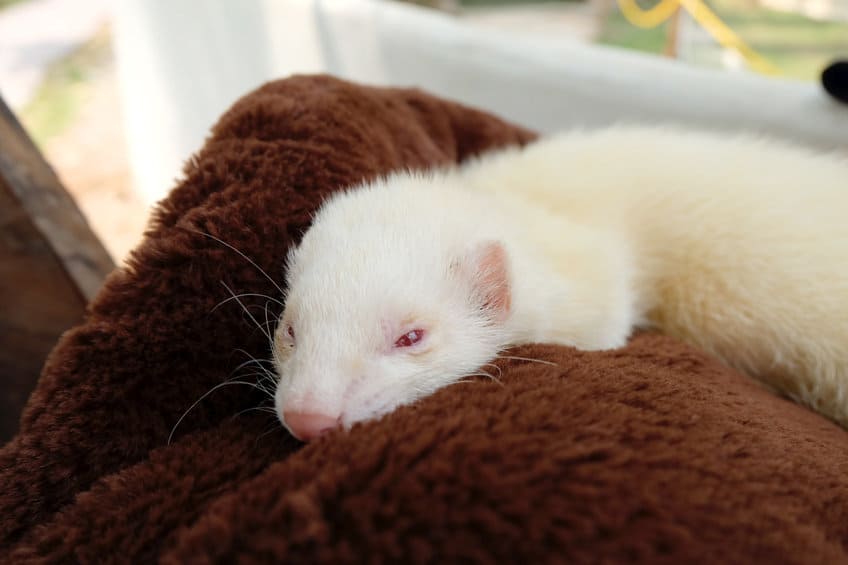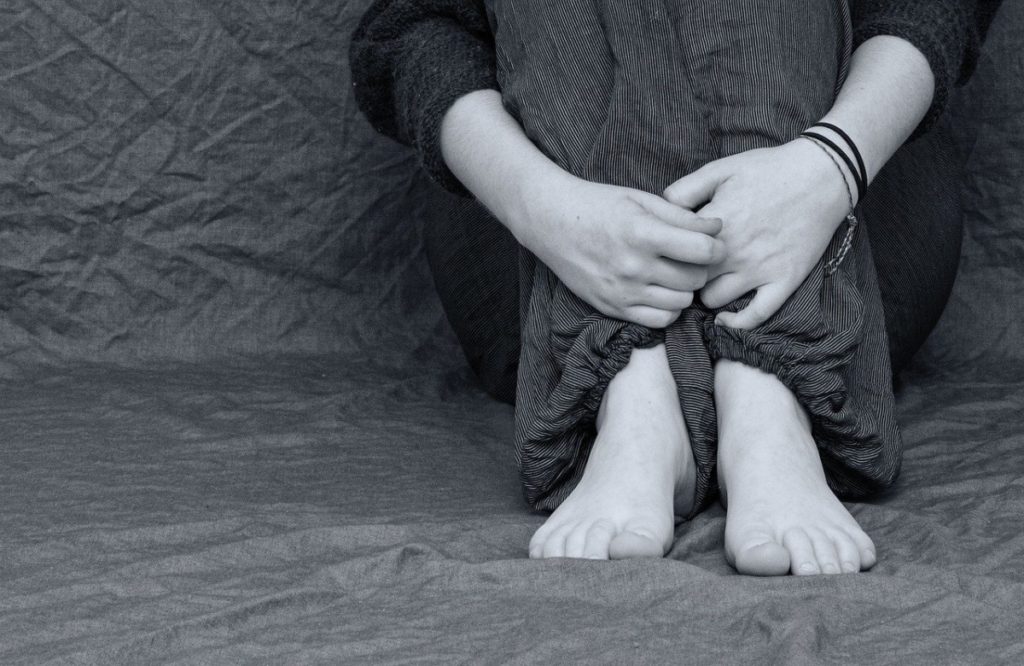Ferrets very quickly become another member of the family and when your furry ferret grows old or develops some sort of illness, it can be extremely devastating to both you and your other family members.
Knowing what to expect and what to be on the lookout for can help you emotionally prepare and catch any developing illnesses early on. In this article, I hope to offer you a little bit of comfort in preparing for and dealing with the loss of a pet.
You will find here some practical advice for how to keep your ferret comfortable at the end of his life. We will also take a look at some things that you can do to help prepare yourself and some ways that you can deal with the grief once your ferret has passed on.
Comforting A Dying Ferret (4 Practical Ways)
1. Provide Your Ferret With A Comfortable Environment To Rest
As your ferret gets older or if your ferret is sick, he is going to have a lot less energy than he used to have. This means he is going to have to spend a lot more time sleeping or lounging around throughout the day, so you should make sure you provide him with a calm and relaxing area to do just that.
To make things easier, place his cage in a quiet, dark area that is away from any dampness (as this can cause respiratory problems.) You should also limit any exercise equipment or toys as your ferret might try to exercise or play despite the fact that he needs to rest. You can talk to your vet about which toys are okay and for how long.
Your ferret also may want to rest with you. Any time that you are watching TV or working, you can feel free to let your ferret cuddle and relax with you, as long as he wants to. Remember, whether he is in the cage or out of the cage, if he has an illness, you want to keep him away from other ferrets to avoid disease transmission.
2. Make Sure Your Ferret Has Enough Food and Stays Hydrated
As your ferret ages, you might start to notice that he is both eating or drinking a lot less. In fact, this is often one of the first signs that you need to take your ferret to the vet to get checked out. Because of this, you will need to pay extra attention to make sure that your ferret is eating and drinking enough throughout the day.
Food is a lot less important than water. As long as your ferret is eating a little bit every day (or even every other day), it is likely enough to keep him comfortable. However, your ferret can experience dehydration after only a day or so of not drinking, which can be extremely uncomfortable for him.
If your ferret is refusing to drink, you can try to entice him to drink by nursing him or putting a treat (like peanut butter) at the end of his water bottle. You can also try giving him foods that are high in moisture, like watermelon and cucumbers.
If your ferret has gone more than 24 hours without drinking, you should reach out to your vet, who will likely suggest that you try giving your ferret an electrolyte-enhanced mixture through a syringe. Even if it has not been 24 hours if your ferret is showing signs of dehydration, reach out to your vet.
There are several different signs of dehydration to be on the lookout for:
- swollen tongue (indicates severe hydration)
- droopy, sunken, dry, or dull eyes
- if you pinch the skin at the scruff of your ferret’s neck and it does not move back into place
- if your ferret stops going to the bathroom or if the urine is dark and has a strong smell
- if your ferret is having problems breathing
3. Shower Your Ferret With Attention
Just like you have become attached to your ferret, your ferret has become attached to you, so he will want you to offer him comfort and lots of attention as he ages. Even if your ferret has not typically liked to cuddle, he may start to as he approaches the end of his life.
However, there are some animals that prefer to be alone and conserve their energy. If your ferret seems agitated or tries to get away from you, it is best to let him have some time to himself.
Other ways you can shower your ferret with attention include lots of yummy treats (as long as your vet approves) and making sure he has his favorite toys/comfort objects, as long as your ferret does not try to overexert himself playing.
The best way to keep your ferret from getting too hot is to make sure that you keep your ferret in a room with good air conditioning and away from any direct sunlight (meaning you should not put your ferret’s cage directly by a window.) Bigger cages with lots of ventilation are also often helpful when it comes to ensuring that your ferret does not become overheated.
4. Regulate the Temperature For Your Ferret
It is common for animals to struggle to regulate their own body temperature as they start to get older or become sick. If ferrets get too hot, they can become overheated and deal with a variety of different problems, such as a heatstroke which can lead to an earlier or more uncomfortable death.
Conversely, when ferrets get too cold, they can develop hypothermia. Remember, it does not necessarily have to feel freezing to you to cause problems for your ferret.
If at all possible, keep them in a room with a temperature between 69 and 72 degrees Fahrenheit. That is the temperature that your ferret will be most comfortable with, but even if you cannot manage those exact temperatures, you want to make sure the room never gets hotter than 77 degrees or colder than 60 degrees.
If you are struggling to keep your ferret’s cage warm, you can try to use a small heat lamp. However, this is only a good option if your ferret has a large cage so that the heat can disperse and escape if necessary. You also will want to keep a thermometer in your ferret’s cage if you are using a heat lamp to make sure it does not end up getting too warm.
Some ferret owners prefer heating pads over lamps, but you usually have to put the pad inside of the cage, and it can cause major problems if your ferret chews on it.
Should I give my ferret medicine for pain management?
When you start to notice the signs that your ferret might be getting sick or dying, you should take him to the vet to get checked out. Even if there is nothing your vet can do to completely heal your ferret, the vet will likely be able to provide you with some sort of medicine or pain management to give your ferret. Making sure your ferret has all prescribed medications and treatments will ensure that he is as comfortable as possible.
How Do I Know If My Ferret Is Dying?

Being on the lookout for signs that your ferret is ill or dying can help you emotionally prepare and give you the chance to get your ferret to the vet in time if treatment is possible. A lot of these symptoms can be completely normal or indicative of very treatable diseases, but it is always better to be safe and have your ferret checked out by the vet if you notice any of the following concerning symptoms.
- Lack of Appetite: As ferrets approach the end of their life, they often lose most or all of their appetite. When this happens, you need to pay a lot more attention to their water intake. Sometimes, when ferrets begin to slow down their eating, they also start to drink less, which can lead to dehydration. If your ferret has gone several days without eating or just 24 hours without drinking, you should reach out to your vet.
- Losing Weight: Your ferret losing weight can also be a sign that he is starting to age. While it is normal for ferrets to lose and gain weight at different times of the year, any major and sudden weight loss (especially if it is paired with other symptoms on this list) can be cause for concern.
- Lethargy: When ferrets become sick or start showing signs of aging, they often start to appear weak and do not move around as much. If you notice your ferret becoming lethargic, you should take him to the vet immediately. It could just be a sign of normal aging, but if it is indicative of a health problem, it is always best to try and catch it early on.
- Difficulty breathing: Ferrets commonly have respiratory problems, and they are even more likely to occur as your ferret ages. As your ferret nears the end of his life, you may notice him start to sneeze, cough, wheeze, pant, heave, etc. Pale or blue gums can also indicate a lack of oxygen.
- Vomiting/Nausea: Most animals will vomit every now and then, but regular or frequent vomiting can be indicative of a more serious problem. Signs of nausea (drooling, rubbing their face against objects, working their paws against their mouth) can also be a sign that your ferret may be approaching the end of his life.
- Discharge: When a ferret has a lot of discharge or pus coming from his eyes or nose; it is often a sign of distemper. If your ferret is showing signs of distemper, you need to see a vet immediately as it is a fatal disease for ferrets.
- Diarrhea, Blood in Stool, No Feces: Any unhealthy or abnormal bowel movements including diarrhea, odd odors, black colors, blood in the stool, or no longer having bowel movements at all can be a sign of major health problems. Sometimes, these health problems are completely treatable with a simple medication, but they can also be more serious problems or even fatal.
- Seizures: Seizures or tremors are common symptoms of a variety of illnesses that animals tend to get as they age or near the end of their lives. They can be signs of neurological problems along with other symptoms like a constant tilting of the head, rapid eye movement, lack of coordination, or semi-paralysis. Sometimes, even if the problem itself can’t be treated, the symptoms can be alleviated to keep your ferret happy and comfortable for as long as possible.
- Dull Fur/Skin Problems: Dull fur or skin problems are often a sign that your ferret is aging and nearing the end of his life. Older ferrets also tend to have more hair loss. While this can be a sign of normal aging, it is better to be safe and have your ferret checked out by the vet.
Ferret Most Common Causes of Death
On average, ferrets live between six and ten years, and many end up dying from old age. However, there are a variety of other diseases that can be fatal, especially to older ferrets.
For instance, there are a few types of cancers that are common to ferrets, such as Isulinoma, Lymphoma, and Adrenal gland cancer. Both cardiomyopathy and heartworms are common heart diseases that ferrets can get.
Ferrets can also develop bacterial infections, contract viruses like distemper and influenza, and end up with a variety of different parasites that can be fatal if not caught and treated early on.
Ferrets can also be their own worst enemy and end up eating something or developing a hairball that can lead to an expensive and dangerous gastrointestinal blockage.
Finally, if you have an unspayed female ferret and she is not mated when she goes into heat, it can be fatal.
Many illnesses that ferrets can get that lead to death happen slowly, so you have time to mentally prepare, but unfortunately, things like blockages can come more suddenly and catch you off guard.
Should I Euthanize My Ferret?
Some ferret owners decide to euthanize their pets at the end of their life. This might be the best option if your ferret has some sort of terminal illness that is causing him a lot of pain or preventing him from basic functioning. Other people decide to go this route if their ferret has a chronic disease and they are unable to fund all the different treatments and medications.
While you are almost never ready (emotionally) to put an animal to sleep, there are some things you can do to help you decide whether or not it is the best option for your pet.
First, you should always talk to your vet. You should double-check with your vet that you have explored all your options when it comes to helping your ferret live as long a life as possible. You can ask about any medications or therapy treatments that might help.
You can also ask your vet about how uncomfortable your ferret is or will be. If your ferret has a chronic illness, there is a chance he can be kept comfortable for a while longer before you need to start considering euthanasia. As long as your ferret is not in pain, most vets and owners will tell you it is best to wait as long as possible.
If you and your vet decide that the best route is euthanasia, you may then want to talk to some friends or fellow ferret owners who have gone through the process before. No matter what, it is going to be a very hard day, but your friends can help you mentally and emotionally prepare as much as possible.
What Is the Procedure For Euthanasia?
Some people find it helpful to know what to expect before going in for an appointment. If this is not the case for you, feel free to skip to the next section.
Once you and your vet decide that euthanasia is the best option for your ferret and the appointment is set, you will need to fill out some forms. These are called Euthanasia authorization forms.
On these forms, you will write down information such as the date, who you are, who the pet is, and signing off that you are allowing your vet to perform the procedure. You will also likely fill out a form as far as what you want to do with your ferret’s body afterward and whether or not you want to be there for the procedure.
The actual procedure is very quick, and your vet will start by administering an anesthetic to make sure that your ferret does not feel a thing and passes away very quickly and peacefully. Usually, euthanasia is done by stopping your ferret’s heartbeat after he has been put to sleep.
How Much Does Euthanasing a Ferret Cost?
The exact cost of euthanasia varies from place to place and vet to vet, but it will usually be somewhere between $35 and $50, not including the cost of cremation or burial, depending on what you are wanting to do with your ferret’s body.
How To Deal With The Aftermath Of Your Ferrets Death

1. Thinking Of What to Do With Your Ferret’s Body
You may want to start to consider what you are going to do with your ferret’s body now. While it can be upsetting to think about it, you will be grateful you already made the decision later on, so you do not have to think about it during the grieving process. There are two main things that you can do: cremation and burial.
If you decide to cremate your ferret, your vet or a cremation service will likely provide you with two options. The first is a communal cremation. In communal cremations, your pet and other pets will be cremated at the same time, and then the cremation service will likely bury or scatter the ashes for you. This will likely cost between 20 and 50 dollars.
On the other hand, if you want to take home your ferret’s ashes in an urn or scatter them yourself, you can get your ferret privately cremated. In a private cremation, they will cremate your ferret on its own and then allow you to take home the ashes if you want. A private cremation will likely cost at least $150 and possibly a good bit more.
If you decide to bury your ferret, you can either do so in your backyard or at a pet cemetery. At a pet cemetery, you will likely have to buy the plot of land, but in most states, you can also bury your ferret in your backyard. Different states have different regulations when it comes to pet burial, but most of the time, it is okay as long as you bury your ferret at least one foot down.
There are several different companies that you can order pet caskets or urns from if you decide that you want one. Most of the time, all you have to do is go online and pick out the casket you want, make sure that you order the right size (most companies will provide you with a sizing guide based on the size of your pet), and they will ship it right to you. Additionally, a lot of pet cremation services will offer you an urn if you choose to go that route, which can make the process a lot simpler.
2. How To Memorialize Your Ferret
Oftentimes, memorializing your pet after he passes can help you grieve and process the loss of your beloved animal. There is no right or wrong way to go about memorializing your pet, but below, you will find several different options if you are looking for some ideas for how you could go about doing this.
- Write an obituary. After a person dies, it is tradition to write an obituary highlighting some information about that person and cherished memories. Writing an obituary about your pet can be a great way to honor his memory and process your grief. You can write about when your ferret joined your family, their favorite toys, any cute quirks, and some of your favorite memories with your ferret. You can either post this online or save it to look back on whenever you want.
- Create a photo album or video journal. Going through and collecting all of the photos or videos of your pet can be a really great way to help you process your grief and remember your ferret. Then, once you have it all together, you can look back on it later whenever the mood strikes you.
- Make a donation. If there is a particular pet organization or shelter that you like, a really great way to memorialize your pet can be by making a donation in your ferret’s name. This can help ensure that other ferrets and pets get the care that they need.
- Get some sort of keepsake. Getting a portrait made or some sort of memento that you can keep in your house can be a really great way to memorialize your ferret and keep his memory alive. Some people decide to make a living memento by planting a flower or plant of some sort where they buried their ferret or scattered the ashes.
- Get another pet. The time frame for when you are ready to get another animal is different for everyone, but some people find it helpful to bring home another pet when they lose a ferret. This way, they have something to focus their love and attention on rather than their grief.
3. Grieving Your Ferret In A Healthy Way
Losing a pet can be a very hard and even traumatic experience, so it is important to give yourself the time and the space to grieve the loss in a healthy way. While there is no one-size-fits-all road map to grieving the loss of a pet, there are several different things that you can do to help work through the loss in a healthy way.
Start by acknowledging and accepting your grief. Sometimes we can feel tempted to minimize our loss or grief and try to just rush right past it. Doing this can prevent you from really dealing with the emotions and moving past them. Give yourself permission to feel the whole host of different emotions that come with grief and feel free to express them to yourself or to other people.
Additionally, taking time to process everything you are feeling and the loss can be really helpful. You can do this by talking to other people who can sympathize with your loss. This could be friends, family, or even a support group.
You can also process your emotions by journaling about them if you prefer to process them by yourself rather than with other people.
Remember, grieving happens gradually and there is no timetable that you need to stick to. Do not let other people tell you how your should be feeling or how quickly you need to move on.
Additionally, make sure that you take care of yourself. Losing a pet can be very emotionally and physically exhausting, so you need to pay a little extra attention to make sure you are taking care of your physical needs in addition to your mental ones (enough food, plenty of sleep, etc.).
When Can I Start Thinking Of Getting Another Ferret?
The best time to get a new ferret after losing one is a very personal decision. Only you will know when the time is right and when you are ready to welcome a new pet into your home. Some people find bringing home a new pet to be very helpful in the grieving process. It gives them something to pay attention to and put their energy towards.
On the other hand, some people want to wait months or even years between bringing home a new pet. This could be because they do not feel ready to open their heart up to another potential loss or because they feel as if they would end up resenting the new pet.
Whatever time frame you decide to go with, be careful that you are not rushing into your decision. Take time to figure out what would be best for both you and your new animal, and do not let any other people (friends, families, strangers, etc.) push you into a decision you are not ready for or stop you from bringing home a new animal if you know that it will be good for you.
However, if there are other family members in your household, make sure that you include them in the decision. They may not have the same grieving process and time frame as you.
Finally, remember that you are not replacing your lost pet. This can help you avoid feeling guilty, and it is an important reminder about expectations for your new pet. Even if you get a pet that looks like your old ferret, he will likely act differently, which could lead you to feel disappointed if you were expecting them to be similar.
Remember, you are creating a new relationship with a new pet, not replicating an old relationship. Sometimes buying a new ferret that is of a different color and gender can help you keep them separated in your mind if you are feeling tempted to try to make a replacement.
As long as you take your time making the decision, there is no right or wrong time to bring home a new ferret. You have to do what is right for you and your pets.
Here are some resources that you can look to for help in coping and dealing with the loss of your pet:













